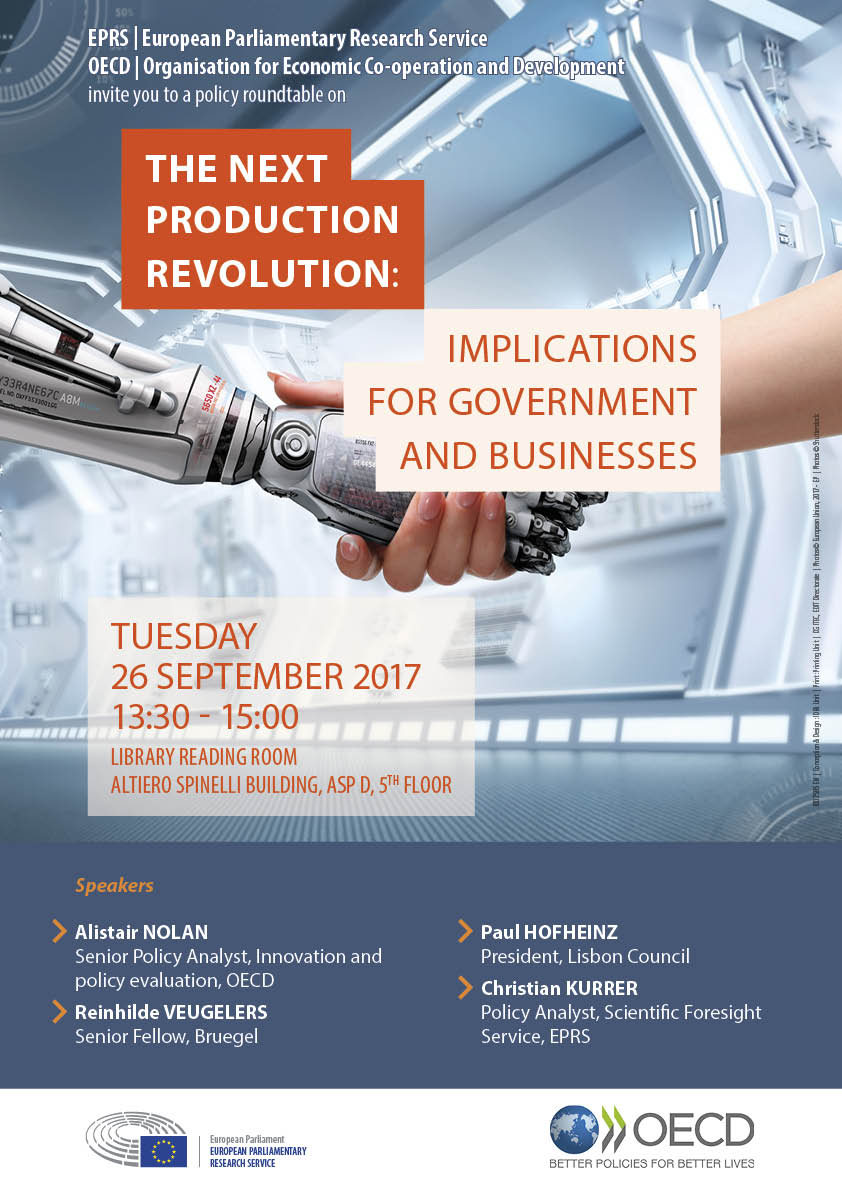Written by Marcin Grajewski,
 Businesses and governments cannot ignore that the global economy is on the verge of another revolution in production. This new world of manufacturing is emerging from the confluence of fast-developing digital technologies, new materials and productions processes, offering tremendous opportunities to create wealth and improve human life, but requiring appropriate regulation, as well as suitable business, investment and education strategies, according to analysts speaking at a conference in the European Parliament. The event, entitled ‘Next Production Revolution: Implications for Governments and Business’ was organised by the European Parliamentary Research Service (EPRS) and the Organisation for Economic Cooperation and Development (OECD), at the European Parliament Library Reading Room on 26 September 2017.
Businesses and governments cannot ignore that the global economy is on the verge of another revolution in production. This new world of manufacturing is emerging from the confluence of fast-developing digital technologies, new materials and productions processes, offering tremendous opportunities to create wealth and improve human life, but requiring appropriate regulation, as well as suitable business, investment and education strategies, according to analysts speaking at a conference in the European Parliament. The event, entitled ‘Next Production Revolution: Implications for Governments and Business’ was organised by the European Parliamentary Research Service (EPRS) and the Organisation for Economic Cooperation and Development (OECD), at the European Parliament Library Reading Room on 26 September 2017.
The conference revolved around the recent OECD report, The Next Production Revolution, which examines the implications for enterprises and state regulators of new and emerging production technologies, such as the Internet of Things, advanced robotics, sophisticated algorithms, industrial biotechnology, nanotechnology, and 3D printing. As these technologies transform the production and the distribution of goods and services, they will have far-reaching consequences for productivity, skills, income distribution, well-being and the environment.

Alistair Nolan, senior OECD economist in the Directorate for Science, Technology and Innovation noted that ‘The combinatorial nature of digital and other new technologies makes them transformational. The more the governments and firms understand how production could develop in the near future, the better placed they will be to address the risks and reap the benefits’. As an example, he showed pictures of hugely complicated aeroplane parts, that would have been impossible to manufacture using traditional moulding processes. He also spoke of inventions such as graphene nanomesh, and metals that shrink rather than expand when heated.
The expected gains from the next production revolution are badly needed to counter declining productivity growth that contributes to stagnant or declining incomes in many countries. Nolan pointed to the 5 % to 6 % higher output and productivity of United States firms that adopt data-driven decision-making, particularly given those firms’ other investments in information and communication technology (ICT). The Internet of Things reduces costs among industrial adopters by 18 % on average. Autonomous mine haulage trucks could increase output by 15-20 %, lower fuel consumption by 10-15 % and reduce maintenance costs by 8 %.

Nolan listed wider access to critical ICT infrastructures, reduced barriers to diffusion, increased interoperability, resolving issues of liability, transparency and ownership, and managing digital security, as the main challenges for governments and businesses. The problem of repairing domestic machines could be simple to solve with 3D printing of spare parts, for instance, but intellectual property issues would have to be resolved first.
Echoing the recommendations of the OECD report, Professor Reinhilde Veugelers of KUL University and a Senior Fellow at the Breugel think tank, said governments and businesses should think longer-term in research, and innovation, yet implement new technologies faster in real life. In the Professor’s view, Europe lags behind some other regions in the most advanced new technologies: ‘The EU has innovation capacity mainly in medium-high technology sectors (e.g., aerospace, automobiles, chemicals and industrial machinery), but not in high R&D intensity activities, such as software, biotechnology and computer electronics’.

However, Veugelers cautioned that even the best policies would not bring back millions of old-style, production-line jobs as promised by some politicians. ‘The importance of manufacturing will not come from its sheer size, but from the quality of its activities, from productivity growth’, she added, stressing the need to offer innovative solutions in vocational training, before noting that the decline of manufacturing share in jobs and massive outsourcing to Asia seem to have ended.
Paul Hofheinz, president of the Lisbon Council think tank, challenged the view that robots and computers are stealing jobs from people, ‘I do believe that there is going to be some job shifting and some job losses in certain places, but I don’t think that the Armageddon is coming, unless we are so stupid as to ignore this (the revolution)’. Hofheinz said that embracing new technologies quickly would help fund the European Union’s expensive social security systems at a time of ageing populations. Perhaps the best way to help accommodate the shifts in employment patterns, is by overhauling the education system, notably by putting more emphasis on life-long learning.
Watch the three videos from the event
Alistair Nolan
Reinhilde Veugelers
Paul Hofheinz












Be the first to write a comment.